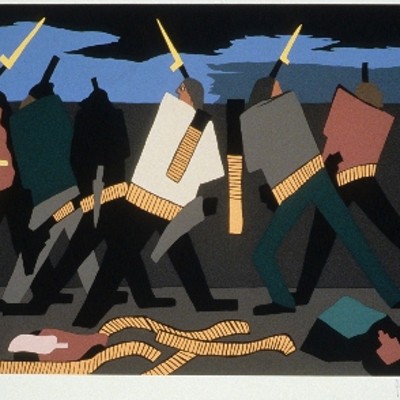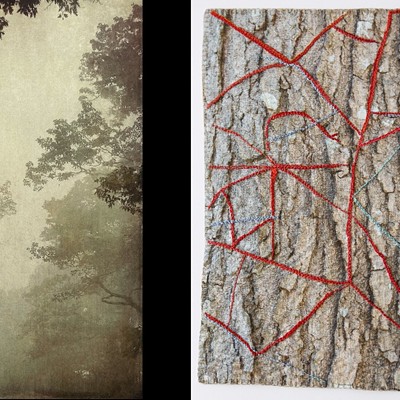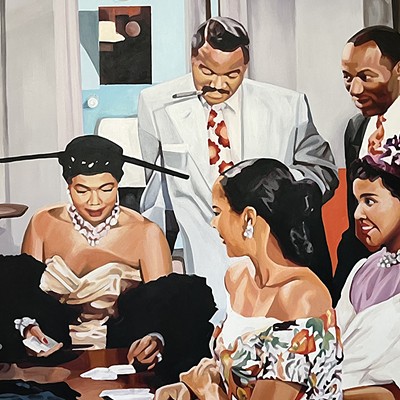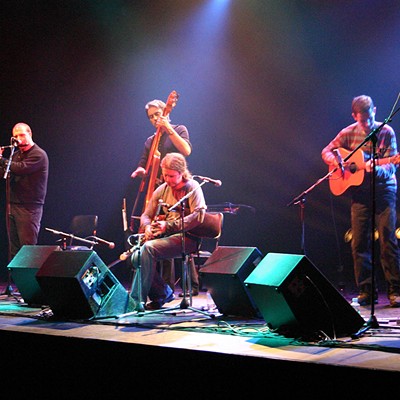On Sept. 11, 2001, Magnum photojournalists were holding their usual monthly meeting in New York City.
They were just getting started that bright Tuesday morning—having a cup of coffee, perhaps, or scanning the agenda—when they got news that a plane had hit the World Trade Center. The photographers bolted from the room and raced downtown.
The pictures they shot that day were extraordinary: a mushroom cloud exploding upward. Terrorized workers dashing through the streets. The sun glinting on the clouds of debris. Somber firefighters trooping into the maelstrom.
Gathered into the book New York September 11, the photos they shot that day rise to the level of art. Ever since, artists in all media have been responding to the same tragedy.
Within months of Sept. 11, Anne Nelson wrote a 9/11 play, The Guys. A journalist and Columbia University professor, Nelson had helped a fire captain write eulogies for the dead among his crew, and her two-person play is a fictionalized version of their conversations. The Guys was first staged in December 2001, just three months after hundreds of firefighters lost their lives; soon, it became a movie. Sigourney Weaver will reprise her role in a 10th-anniversary presentation of the play this month in New York.
A number of playwrights rushed out new Sept. 11 plays in the year after the attacks, including Charles Evered (Adopt a Sailor) and Neil LaBute (The Mercy Seat). Most artists, though, have taken longer—much longer—to absorb the enormity of that day.
"In the beginning, people weren't ready to process what happened," says Tucson author Laila Halaby. "It takes a long time to get it. The arts stuff will continue to come out for a long time to come."
Halaby wrote her first book, West of the Jordan, about four girls in a fictional Palestinian village, as a deliberate response to the distorted views of Arabs that prevailed in America after the attacks. But it didn't deal with Sept. 11 specifically.
In her next novel, though, Sept. 11 unexpectedly turned up. Set in Tucson, Once in a Promised Land chronicles the deteriorating marriage of a Jordanian couple, professionals who live in the foothills. Sept. 11 "crept in," Halaby says.
It was impossible to write about such characters, in that period, and "not have 9/11 play a part," Halaby says. In the climate of fear after the attacks—including antipathy toward Arabs—the fictional husband and wife become ensnared in a web of suspicion. Even now, 10 years later, she adds, almost no one is "really ready to hear the Arab perspective."
Halaby reads from Once in a Promised Land (Beacon Press, 2007) at 3 p.m., Saturday, Sept. 10, at the Joel D. Valdez Main Library, 101 N. Stone Ave. Free.
Her reading is part of a series of events in Tucson marking the 10th anniversary of Sept. 11.
Valarie Kaur's documentary Divided We Fall: Americans in the Aftermath presents the viewpoints of Arab Americans, Sikhs and Muslims; it screens at 7 p.m., Sunday, Sept. 4, at the Fox Tucson Theatre, 17 W. Congress St.; 624-1515. A $10 donation is requested.
For a complete list of happenings, seewww.tucson911.org and web.sbs.arizona.edu/college/911.
Patrick Carson didn't begin his Sept. 11 play, Elevator, until last year, and he says he has no idea where the idea came from. One morning in April, he says, he was in his Tucson backyard enjoying a cup of coffee. Suddenly, he started thinking about the people trapped in the elevators at the World Trade Center on Sept. 11, 2001.
"I must have been thinking about the anniversary (coming up)," he says.
Carson hurried into the house and Googled up a lengthy USA Today investigation of the elevator system in the Twin Towers. "The article blew my mind," he says. "The doors were locked with a hatch latch," making it next to impossible to escape.
Next, he pored over accounts of the people trapped inside, and before he knew it, he was writing a screenplay. He's since adapted the work into a stage play, and Elevator will make its debut this week at the Pima Community College Center for the Arts.
"It starts four minutes before the plane hits, and runs in real time—102 minutes—until the last tower collapses," he says. Its six characters combine traits from the real-life people he learned about.
"Sept. 11 wasn't real to me before, until I read what these people went through," he says. He hopes that the play makes it real for the audience, too. "It's easy to say, 'This was our worst disaster.' And it's easy to forget."
Produced and directed by Carson, Elevator runs at 7 p.m., Thursday, Friday and Saturday, Sept. 1 through 3; and at 1 and 7 p.m., Sunday, Sept. 4, at the PCC Center for the Arts Proscenium Theatre, 2202 W. Anklam Road. Tickets are $14 to $29. For more information, call 477-7529, or visit www.elevatorstageplay.com.
Local playwright Toni Press-Coffman knew almost from the day that United Flight 93 went down in a Pennsylvania field that she would write a play about it. But it took some time for her to start writing.
"I didn't do anything on it for a year or two," she says. "It was upsetting to read about the lives of the people killed."
Ten years after the crash, her play, United, still isn't finished. And Press-Coffman is looking to Tucsonans to help her get it done. A staged reading opens this weekend, and audiences are invited to stick around afterward and give critiques.
"I'll work on the play in between" the readings, Press-Coffman says, taking audience feedback into account. Anyone who buys a ticket to one session can come back free to another one, to see if their suggestions made it into the play.
"It's a big undertaking," Press-Coffman says. In a way, the group process she's opening up reflects what happened on the plane, where 40 strangers banded together to stop the terrorists who were piloting the plane toward a target that's still unknown.
"This is a play about what every single one brought to it," she says. "They decided to do this together."
Directed by Christopher Johnson and produced by Winding Road Theater Ensemble, United will have six staged readings in four locations. Sixteen Tucson actors take the parts. It opens 7 p.m., Sunday, Sept. 4, at St. Francis in the Foothills, 4625 E. River Road; and continues at 2 p.m., Sunday, Sept. 11, at Christ Presbyterian Church, 6565 E. Broadway Blvd.; 6:30 p.m., Tuesday, Sept. 13, at Episcopal Church of the Apostles, 12111 N. La Cholla Blvd., Oro Valley; 2 p.m., Saturday, Sept. 17, at Christ Presbyterian Church; 7 p.m., Sunday, Sept. 18, at Live Theatre Workshop, 5317 E. Speedway Blvd.; and 7:30 p.m., Thursday, Sept. 22, at Christ Presbyterian Church. Admission is $10. Call 401-3626, or visit windingroadtheater.org.
Oftentimes, plays are written long before they ever spring to life on the stage. Philadelphia playwright Peter Bonilla has been developing his Sept. 11 play, The Human Equation, for years. But it will get its world premiere, also by Winding Road Theater Ensemble, in Tucson this month, in a fully staged production.
Bonilla's script is about Kenneth Feinberg, the lawyer who doled out money from the federal compensation fund to the survivors of those lost on Sept. 11. Feinberg's task was to determine the monetary value of each person's life, based on profession and expected future earnings.
The playwright gathered his material by interviewing Feinberg, by reading Feinberg's book What Is Life Worth?, and by examining the records of the approximately 1,000 families who appealed their allotment.
The play came to Winding Road via the National New Play Network, which circulates works to theater companies around the country.
"We program one new play each season," says Winding Road's Glen Coffman, who directs. "We decided with the 10th anniversary coming up, we'd plan this as the season opener." The company will bring Bonilla out for opening night, Friday, Sept. 9.
The Human Equation runs at 7:30 p.m., Friday and Saturday; and 2 p.m., Sunday, Sept. 9 through 24, at Christ Presbyterian Church, 6565 E. Broadway Blvd. (There is no show on Sept. 11.) Tickets are $20 general; and $17 for seniors, students, military members with ID and theater artists. Call 401-3626, or visit windingroadtheater.org.
Finally, on the Sept. 11 anniversary, Tucsonans will hear a brand-new work of musical art. Paired in a concert with Mozart's timeless Requiem, a new oratorio by composer Stephen Paulus will be sung by the Tucson Chamber Artists and played by the Tucson Symphony Orchestra. Paulus will use texts from various traditions to memorialize those dead in a tragedy now 10 years past.
The "Remembrance and Renewal" concert takes place at 3 p.m., Sunday, Sept. 11, at UA Centennial Hall, 1020 E. University Blvd. Tickets are $19 to $64. Call 621-3341, or visit www.uapresents.org.











